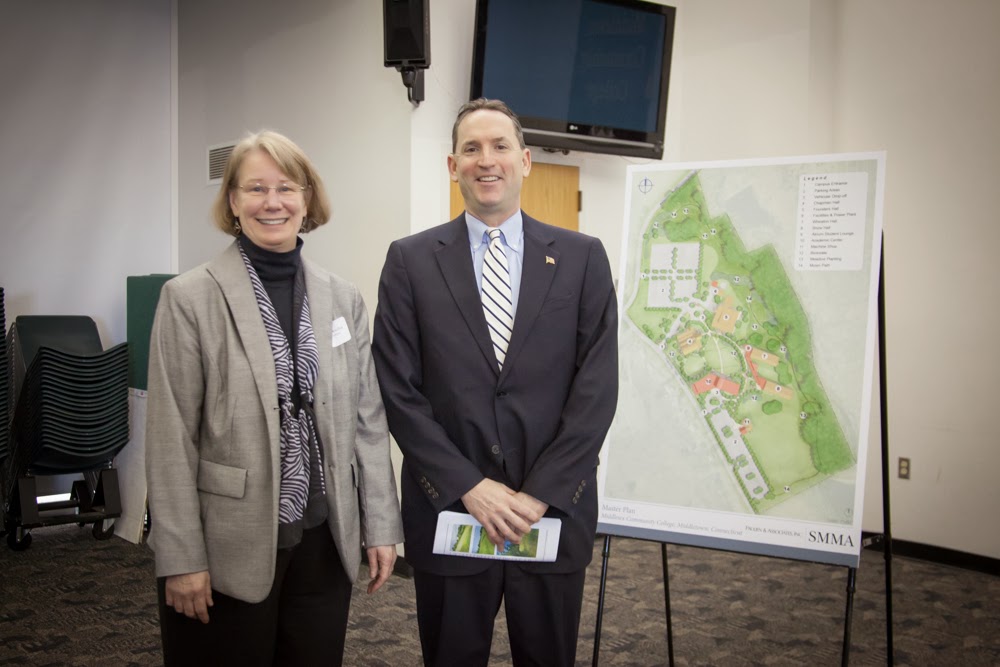 |
After
several years of pursuing a mission of increased sustainability, Middlesex
Community College has made great strides – many of which were discussed yesterday
at the College’s fourth annual Legislative Breakfast. The breakfast, which was attended by state
legislators, local elected officials, and community and student leaders,
featured a first look at MxCC’s new environmentally sustainable master campus
design plan.
In general,
the College focused on four areas for increased sustainability in its master
plan: social, economic, environment, and academic. Dr.
Anna Wasescha, MxCC president (pictured here with Connecticut State Senator Paul Doyle), discussed how the new campus design addresses
these areas with increased efficiencies in campus operations and maintenance,
new, “greener” academic buildings, improved open space use, new or improved
walking and gathering places, and enhanced transportation efforts. The College also plans to migrate to the use
of natural gas as a major step in reducing its carbon footprint and operating
costs.
These
changes are taking place amidst growing student enrollment at MxCC, which Dr.
Wasescha tributes to the College’s emphasis on engaging students, adding
faculty, and enhancing a sense of community.
She also gave credit to the efforts of our legislative delegation that
were successful last year in advocating for a new 69,000 square-foot building
on the Middletown campus. All the
publicity that the proposed new building received represents
a strong vote of confidence in Middlesex Community College and a demonstration
of the state’s willingness to invest in modernizing and expanding the campus.
Connecticut DEEP Deputy Commissioner Katie Dykes was a guest
speaker at the event. She highlighted
the state’s energy policy and legislative agenda, and its efforts to revamp the
regulatory infrastructure, taxation and electric rates. She commented that many
of the steps taking place at MxCC are in line with the ambitions of the DEEP,
and that it serves as an example of how to leverage proven energy and
environmental policies.
Connecticut State Senator Paul Doyle (D, 9th District)
delivered the keynote speech, discussing many of the steps the state is taking
to address emissions and environmental concerns. While the senator felt more could be done on
the federal level, he thought Connecticut was taking a leadership role to
address these concerns on a state level.
He commended MxCC for its new master plan and the efforts the College
was making to create a more sustainable and forward-thinking institution. Senator Doyle concluded his remarks with
comments directed toward the students in the audience. He encouraged them to become actively
involved in public life and to consider public service careers.
“We are so fortunate to have the tireless support of our
elected officials,” Dr. Wasescha said. “Our
constituents are their constituents. Together,
we are working to build a vital democratic society, based on an energy-efficient
economy in which citizens are fully engaged through their work and in their
communities. That is why sustainability
is so critical to us all, and certainly here on our college campus.”

1 comment:
I would not support any more building for MxCommy College in that location. The college is in a far-flung area, reached by the majority of its students and staff by car. It would be smarter, if the school and the state truly wants to achieve genuine sustainability, for the college to move closer to downtown MIddletown. Ideally, the area now held by CVH between Silver Street and the river would be a great location. This would put the school within walking distance of downtown, and future train service. The current CVH can trade places with MxCC, as those occupants do not travel daily.
Post a Comment